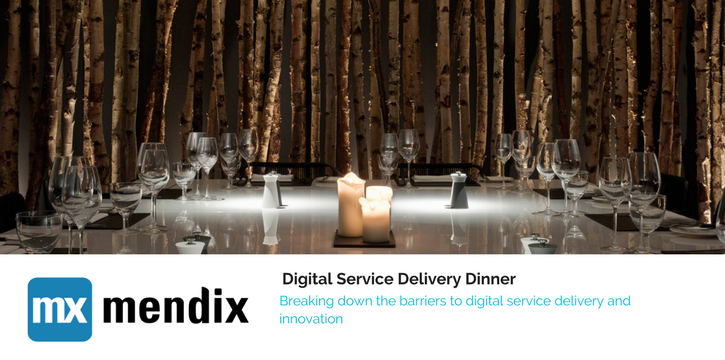The Digital Service Delivery Dinner took place on 13 March 2018 at the South Place Hotel; it concerned “breaking down barriers to digital service delivery”, and unusually for a Nimbus Ninety event, we were pleased to talk to members exclusively from the public sector and the third sector.
Members were invited to discuss:
- Doing much more with a lot less: what are the principle challenges facing service delivery across public sector and non-profit organisations?
- Shared examples of ‘best in class’ digitisation: what worked well, and what were the main benefits and outcomes?
- A roadmap for the future: how can digital services be delivered cheaply, effectively and innovatively? How can successes be shared?
More with Less
In the private sector, investment decisions are made along a pleasingly simple axis; will this make us money? When, and how much? Unfortunately, investment in the public sector is beset by issues. All spending, including that which carries well-defined short-term reward, can be contentious.
Part of this is just the innate structure of the public sector. A democracy means that politicians often reverse-engineer policy decisions from communications messages. A democracy means that sometimes there are policy changes which are capricious. A democracy means politicians repeatedly promise more services for less money. A democracy means that elected officials will preside over subordinates with more experience in any given department.
But there is plenty which should not be treated as inevitable. Are age-based pay structures an inevitability in a government system? Or could provision be made for rewarding talent, even in ways which bolster prestige or influence rather than money? If there is failure to celebrate operational talent, how can that be addressed?
Nor is the public sector doomed to be hopelessly digitally inefficient. The Government Digital Service is a great example of public sector digital done right. Crucially, it has high level buy-in which enables it to bypass bureaucracy, make decisions, and apply talent.
Culture Change
The issue that causes the most concern beyond money is culture. Talented, impatient people often feel like they can’t express themselves and run for the exits. Process-oriented people are better at ironing out mistakes and kinks feel low status compared to these people. The two groups rub up against each other and both try to consolidate power within their half of the organisation.
Mutual respect and a culture with well-oiled working parts could help. One analogy distinguishes between “pioneers,” “settlers”, and “town planners.” Neither is optimal without the others.
If you don’t have the settlers, everybody remains a cowboy. They set up shadow IT operations, they manage their affairs without reference to complying with organisational policy. Actions are duplicated several times because everybody is doing things one their own terms.
If you don’t have any pioneers, nothing ever changes. A certain type of town planner finds thinking outside the box extremely difficult and will continue to do the same thing again and again when slicker practises are possible; at the expense of everybody's time.
(This is a microcosm of the problem at large. Just as an individual won’t invest two minutes learning the new software to save themselves hours on the old software, organisations frequently won’t spend thousands to save themselves millions.)
This can help people navigate to the part of the process that suits them best. It is simply no good expecting one person to do the other; it goes very deeply into the core constituent components of a personality.
Sharing Success
One big prospective windfall for organisations could be automation. Since most organisations in these sectors are understaffed, getting the vehicle to drive itself could free the best people to start fixing the problems elsewhere. Chatbots are an intuitive way to talk to a computer if over-complex menus become too challenging for vulnerable users – they can ask directly for what they want.
Looking critically at suppliers could be another place to make savings. Sometimes, suppliers will be selling to multiple branches of government in instances where a single license could be appropriate. Better communication could help to cut down on this practise.
Pleasingly, software has become easier and more intuitive to use. People sometimes look at software as though it’s hieroglyphics. This isn’t true. It’s been 20 years since 1998, and things are designed to be used by large product and user experience teams, which often have free hotlines during work hours if it becomes too difficult.
People declaring that they cannot do it as they are simply too old is usually more about confidence and not trying, rather than failure after a concerted effort. This is a question of confidence building and good management.
Identifying a separate budget which allows individuals to look for ways to improve, innovate, find efficiencies, is a good idea. This could also mean looking at innovation in a more scientific way; trying things without the expectation necessarily that they will work. Then, close scrutinization of failure. While it sounds expensive, the elimination of the person who can fix problems and improve things will mean that a department becomes stuck in the past in the long term. It may help to frame your issues as a "business case" rather than a technical issue to the budget holder, and sell any spending in explicit investment terms.
Getting buy-in from the top is as ever extremely important to making these projects work. This is reflected in members’ experiences and in extensive research.
Finally, it’s useful to encourage the sharing of success. Too often, individuals or departments will jealously guard the successes they have from other departments – it’s theirs. The opposite should be the case. The public and third sectors should think about how to trumpet their successes, in order to spread them as widely as possible.





Leave a Comment